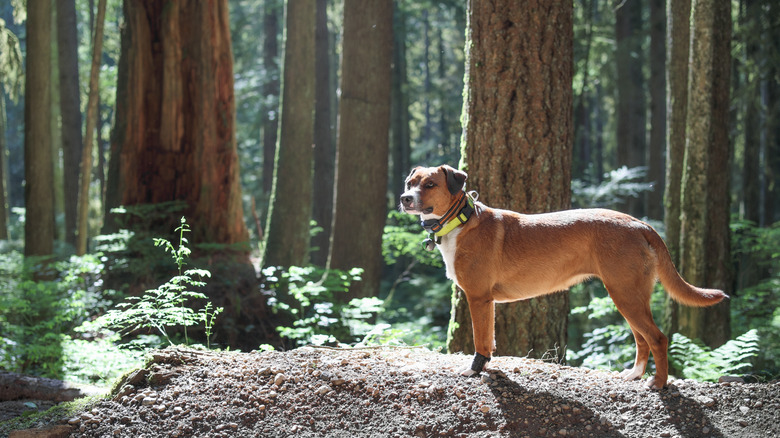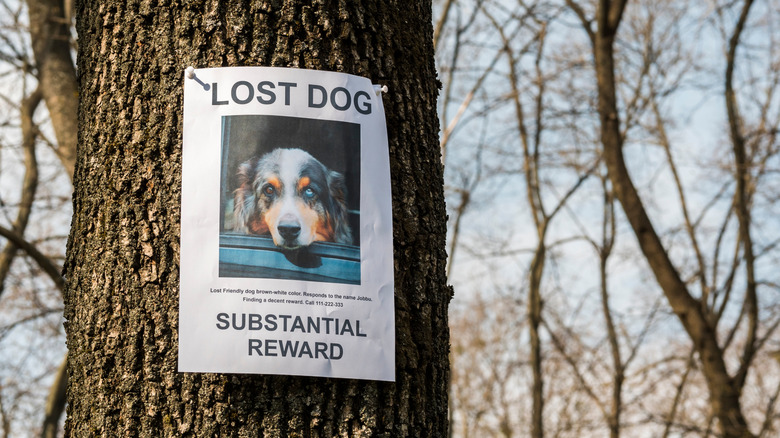What To Do When The Family Dog Runs Away On A Road Trip Or Vacation
Many pet owners consider their dogs part of the family, and leaving them behind when embarking on a trip is a major downside of traveling. Kenneling can be expensive, and it's often difficult to find reliable pet care while you're away. Luckily, there are plenty of pet-friendly vacation destinations where dog lovers will absolutely thrive. Our four-legged family members are only with us for a short time — if we're lucky we'll have them by our side for a little over a decade so it's well worth taking them on a few adventures.
Planning a family vacation with your dog is easy, but you'll want to be prepared for a variety of situations to arise. Even a well-trained dog can behave in unpredictable ways when exposed to new sights, smells, and environments. One of the worst-case scenarios that can occur is for the family dog to run away or go missing while traveling. If you're well prepared and able to act quickly you'll have a better chance of getting your fur baby back quickly and safely according to Alexandra Bassett, a Dog Trainer & Behavior Consultant at Dog Savvy, a private virtual dog training & behavior solutions company.
Bassett spoke to Explore to share her top tips for preventing your dog from running off and how to deal if they do. According to Bassett, dogs that are reactive or get overly excited and anxious are, "more likely to bolt." She suggests formulating a unique approach based on your dog's personality. "Prevention is key, but being ready for an unexpected separation can make all the difference," she told Explore.
What you need to prepare for your trip
Bassett has some great packing hacks for road trips with pets. She recommends investing in a quality collar that is waterproof and has your name and phone number prominently displayed. If your dog gets lost this will ensure that you can be contacted when found. GPS collars and Apple AirTags allow you to view your dog's location from your phone which is particularly useful if your furry friend runs off while hiking in dog-friendly national parks or other remote areas. Basset suggests having your dog is microchipped as well. According to a study by the American Veterinary Medical Association dogs with microchips are returned to their owners 52.2% of the time compared to 21.9% of dogs without microchips.
A collar that has lights or glows in the dark helps to "make your dog more visible to others at night, enhancing their safety and making it easier to locate them in low-light conditions," Bassett explained to Explore. She also suggests bringing along a crate or packable pen with some of your dog's favorite toys and treats to keep them safely enclosed when you're not paying attention.
Bassett also told us that it's important to spend some time training your dog before vacations. "Provide comprehensive off-leash recall training to build a strong response to coming when called, even in distracting environments," she suggested. Leash safety is also critical. Bassett recommends using a leash or long line, "until your dog is familiar and comfortable with their surroundings." Knowing your dog's triggers is also helpful. "Understand that dogs can get spooked by unfamiliar wildlife or loud noises such as gunshots, thunder, fireworks, or the lively sounds of "fireside revelry" at the campsite," Bassett told us.
Take action as soon as you realize your dog is missing
Even if you take every possible precaution, there's still a chance that your dog could escape, run away, or get lost. This panic-inducing situation is every pet owner's worst nightmare, but it's important to remain calm and act quickly. "Time is of the essence!" Bassett reminded us.
The first thing to do is notify everyone around you that your dog is missing. Bassett told Explore that you should "provide specific instructions, such as 'do not chase, just call us or send your location' if the dog is likely to be afraid, or 'may take treats' if the dog is friendly." Next, you're going to want to search the area while calmly calling your dog's name. Basset recommends making sounds and noises that your dog may recognize. Try whistling or shaking their food container. Place items that carry familiar smells near the last place you saw your pet. Food, toys, and clothing are all good options. If you're able, ask other people to help you search.
If your dog doesn't come back quickly, you'll want to let local authorities know that your dog is missing according to Bassett. It's worth making calls to local vets, shelters, and law enforcement agencies. Always use social media to your advantage. "Post about your missing dog on social media and local community groups, including a photo and your contact information," Bassett told Explore. Try to stay overnight especially if you've been staying at dog-friendly campgrounds. Return to the spot you last saw them often — they may return at night when things calm down. In more populated areas, print signs with your contact information and your pet's picture.
Important resources for pet parents with a missing dog
"Losing your dog while on vacation can be scary! Fortunately, there are several apps, websites, and tools available to help reunite lost dogs with their guardians quickly," Bassett told Explore. Ring doorbells have a "lost pet mode" feature that allows you to make a profile and notify homes in the area that your pet is missing. You can also make a profile for your pet and attach a QR code to their collar. Nextdoor is a digital social network for neighbors and it can be useful in notifying the local community about your lost pet.
There are several online tools specifically designed to help reunite people with their lost animals. Bassett recommends PawBoost which sends alerts to local groups and makes posts on Facebook. She also suggests Petco Love Lost which uses facial recognition technology to match photos of lost pets to photos of found pets. FidoAlert is a nationwide pet alert system that will send text notifications to members. PetHub allows you to create an online profile for your pet and creates a QR code for their collar.
"If your dog is microchipped and becomes lost, several databases and tools can assist in locating them. It's essential to keep your contact info updated with the registry," Bassett informed Explore. She suggests checking out online resources like PetLink, HomeAgain, 24PetWatch, Michelson Found Animals, and Findpet.com if your dog is microchipped.



